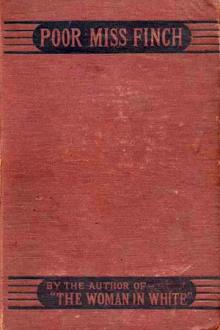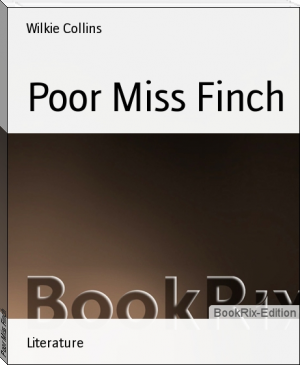Poor Miss Finch - Wilkie Collins (best books to read for beginners txt) 📗

- Author: Wilkie Collins
- Performer: -
Book online «Poor Miss Finch - Wilkie Collins (best books to read for beginners txt) 📗». Author Wilkie Collins
Where do you think I found him? Locked up in his own room! His insane shyness—it was really nothing less—made him shrink from that very personal explanation which (with such a temperament as mine) was the only possible explanation under the circumstances. I had to threaten him with forcing his door, before I could get him to show himself, and take my hand.
Once face to face with him, I soon set things right. I really believe he had been half mad with his own self-imposed troubles, when he had declared he would give me the lie at the door of Lucilla’s room.
It is needless to dwell on what took place between us. I shall only say here that I had serious reason, at a later time—as you will soon see—to regret not having humoured Oscar’s request that I should reconcile myself to him by writing, instead of by word of mouth. If I had only placed on record, in pen and ink, what I actually said in the way of making atonement to him, I might have spared some suffering to myself and to others. As it was, the only proof that I had absolved myself in his estimation consisted in his cordially shaking hands with me at the door, when I left him.
“Did you meet Nugent?” he asked, as he walked with me across the enclosure in front of the house.
I had gone to Browndown by a short cut at the back of the garden, instead of going through the village. Having mentioned this, I asked if Nugent had returned to the rectory.
“He went back to see you,” said Oscar.
“Why?”
“Only his usual kindness. He takes your views of things. He laughed when he heard I had sent a letter to you, and he ran off (dear fellow!) to see you on my behalf. You must have met him, if you had come here by the village.”
On getting back to the rectory, I questioned Zillah. Nugent, in my absence, had run up into the sitting-room; had waited there a few minutes alone, on the chance of my return; had got tired of waiting, and had gone away again. I inquired about Lucilla next. A few minutes after Nugent had gone, she had left her room, and she too had asked for me. Hearing that I was not to be found in the house, she had given Zillah a letter to post—and had then returned to her bedchamber.
I happened to be standing by the hearth, looking into the dying fire, while the nurse was speaking. Not a vestige of Oscar’s letter to me (as I now well remember) was to be seen. In my position, the plain conclusion was that I had really done what I supposed myself to have done—that is to say, thrown the letter into the flames.
Entering Lucilla’s room, soon afterwards, to make my apologies for having forgotten to wait and take her letter to the post, I found her, weary enough after the events of the day, getting ready for bed.
“I don’t wonder at your being tired of waiting for me,” she said. “Writing is long, long work for me. But this was a letter which I felt bound to write myself, if I could. Can you guess who I am corresponding with? It is done, my dear! I have written to Herr Grosse!”
“Already!”
“What is there to wait for? What is there left to determine on? I have told Herr Grosse that our family consultation is over, and that I am entirely at his disposal for any length of time he may think right. And I warn him, if he attempts to put it off, that he will be only forcing on me the inconvenience of going to him in London. I have expressed that part of my letter strongly—I can tell you! He will get it tomorrow, by the afternoon post. And the next day—if he is a man of his word—he will be here.”
“Oh, Lucilla! not to operate on your eyes?”
“Yes—to operate on my eyes!”
THE interval-day before the second appearance of Herr Grosse, and the experiment on Lucilla’s sight that was to follow it, was marked by two incidents which ought to be noticed in this place.
The first incident was the arrival, early in the morning, of another letter addressed to me privately by Oscar Dubourg. Like many other shy people, he had a perfect mania, where any embarrassing circumstances were concerned, for explaining himself, with difficulty, by means of his pen, in preference to explaining himself, with ease, by means of his tongue.
Oscar’s present communication informed me that he had left us for London by the first morning train, and that his object in taking this sudden journey was—to state his present position towards Lucilla to a gentleman especially conversant with the peculiarities of blind people. In plain words, he had resolved on applying to Mr. Sebright for advice.
“I like Mr. Sebright” (Oscar wrote) “as cordially as I detest Herr Grosse. The short conversation I had with him has left me with the pleasantest impression of his delicacy and his kindness. If I freely reveal to this skillful surgeon the sad situation in which I am placed, I believe his experience will throw an entirely new light on the present state of Lucilla’s mind, and on the changes which we may expect to see produced in her, if she really does recover her sight. The result may be of incalculable benefit in teaching me how I may own the truth, most harmlessly to her, as well as to myself. Pray don’t suppose I undervalue your advice. I only want to be doubly fortified, before I risk my confession, by the advice of a scientific man.”
All this I took to mean, in plain English, that vacillating Oscar wanted to quiet his conscience by gaining time, and that his absurd idea of consulting Mr. Sebright was nothing less than a new and plausible excuse for putting off the evil day. His letter ended by pledging me to secrecy, and by entreating me so to manage matters as to grant him a private interview on his return to Dimchurch by the evening train.
I confess I felt some curiosity as to what would come of the proposed consultation between unready Oscar and precise Mr. Sebright—and I accordingly arranged to take my walk alone, towards eight o’clock that evening, on the road that led to the distant railway station.
The second incident of the day may be described as a confidential conversation between Lucilla and myself, on the subject which now equally absorbed us both—the momentous subject of her restoration to the blessing of sight.
She joined me at the breakfast-table with her ready distrust newly excited, poor thing, by Oscar. He had accounted to her for his journey to London by putting forward the commonplace excuse of “business.” She instantly suspected (knowing how he felt about it) that he was secretly bent on interfering with the performance of the operation by Herr Grosse. I contrived to compose the anxiety thus aroused in her mind, by informing her, on Oscar’s own authority, that he personally disliked and distrusted the German oculist. “Make your mind easy,” I said. “I answer for his not venturing near Herr Grosse.”
A long silence between us followed those words. When Lucilla next referred to Oscar in connection with the coming operation, the depressed state of her spirits seemed to have quite altered her view of her own prospects. She, of all the people in the world, now spoke in disparagement of the blessing conferred on the blind by the recovery of their sight!
“Do you know one thing?” she said. “If I had not been going to be married to Oscar, I doubt if I should have cared to put any oculist, native or foreign, to the trouble of coming to Dimchurch.”
“I don’t think I understand you,” I answered. “You cannot surely mean to say that you would not have been glad, under any circumstances, to recover your sight?”
“That is just what I do mean to say.”
“What! you, who have written to Grosse to hurry the operation, don’t care to see?”
“I only care to see Oscar. And, what is more, I only care to see him because I am in love with him. But for that, I really don’t feel as if it would give me any particular pleasure to use my eyes. I have been blind so long, I have learnt to do without them.”
“And yet, you looked perfectly entranced when Nugent first set you doubting whether you were blind for life?”
“Nugent took me by surprise,” she answered; “Nugent startled me out of my senses. I have had time to think since; I am not carried away by the enthusiasm of the moment now. You people who can see attach such an absurd importance to your eyes! I set my touch, my dear, against your eyes, as much the most trustworthy, and much the most intelligent sense of the two. If Oscar was not, as I have said, the uppermost feeling with me, shall I tell you what I should have infinitely preferred to recovering my sight—supposing it could have been done?” She shook her head with a comic resignation to circumstances. “Unfortunately, it can’t be done!”
“What can’t be done?”
She suddenly held out both her arms over the breakfast-table.
“The stretching out of these to an enormous and unheard-of length. That is what I should have liked!” she answered. “I could find out better what was going on at a distance with my hands, than you could with your eyes and your telescopes. What doubts I might set at rest for instance about the planetary system, among the people who can see, if I could only stretch out far enough to touch the stars.”
“This is talking sheer nonsense, Lucilla!”
“Is it? Just tell me which knows best in the dark—my touch or your eyes? Who has got a sense that she can always trust to serve her equally well through the whole four-and-twenty hours? You or me? But for Oscar—to speak in sober earnest, this time—I tell you I would much rather perfect the sense in me that I have already got, than have a sense given to me that I have not got. Until I knew Oscar, I don’t think I ever honestly envied any of you the use of your eyes.”
“You astonish me, Lucilla!”
She rattled her teaspoon impatiently in her empty cup.
“Can you always trust your eyes, even in broad daylight?” she burst out. “How often do they deceive you, in the simplest things? What did I hear you all disputing about the other day in the garden? You were looking at some view?”
“Yes—at the view down the alley of trees at the other end of the churchyard wall.”
“Some object in the alley had attracted general notice—had it not?”
“Yes—an object at the further end of it.”
“I heard you up here. You all differed in opinion, in spite of your wonderful eyes. My father said it moved. You said it stood still. Oscar said it was a man. Mrs. Finch said





Comments (0)